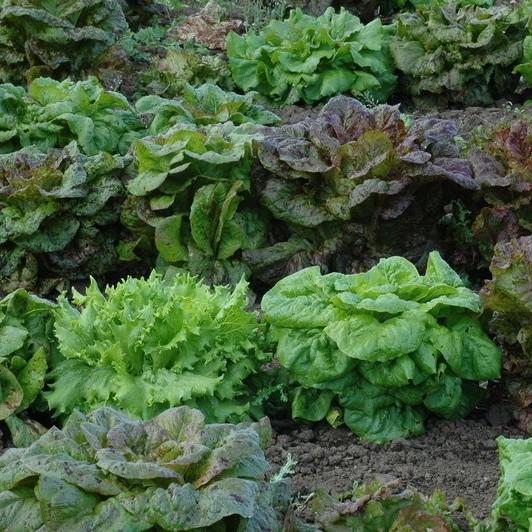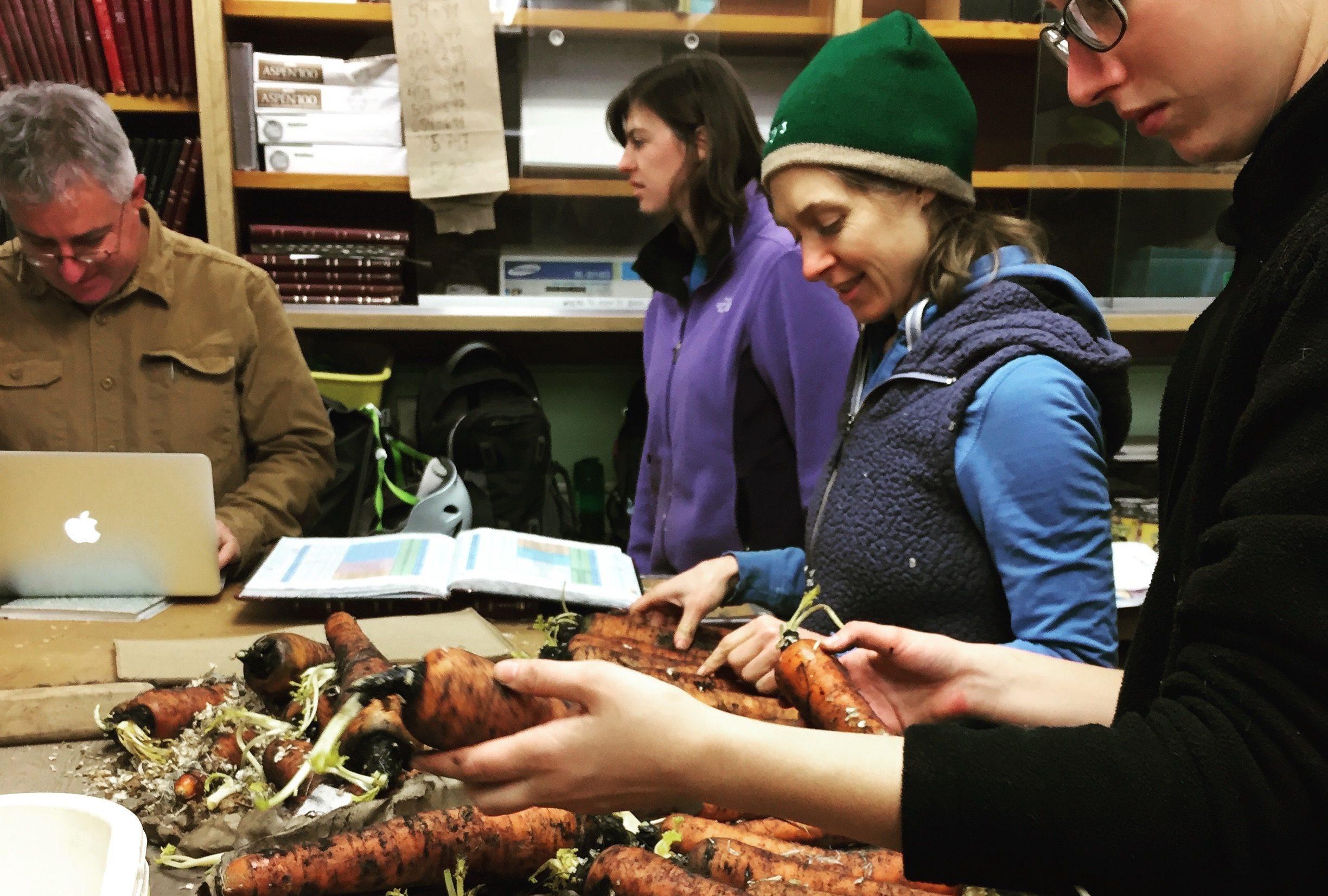Claire Luby
Feature Photo: Irwin Goldman and his plant breeding team at University of Wisconsin-Madison selecting the best roots for replanting to produce seed of OSSI-Pledged carrot varieties ‘Oranje’ and ‘Sovereign’. Photo: Claire Luby
OSSI-Pledged varieties are diverse. They are diverse because they have been contributed by 36 different plant breeders working on 49 different crop species all over the USA, Britain, and Australia. They are diverse because they have been selected for local adaptation in some cases, and wide adaptation in others. They are diverse because some are finished varieties and others are populations of breeding material designed to use to select finished varieties. In addition, some are uniform while others are landraces or are intentionally variable for one or more characteristics.

The breeders and communities who develop OSSI-Pledged varieties used plant germplasm that was already in the public domain and/or was at least not legally restricted for use in breeding. Through their breeding work, they have developed unique and novel material. They are choosing to share the results of their labor under the OSSI Pledge, which they pass along when they distribute seed: “You have the freedom to use these OSSI-Pledged seeds in any way you choose. In return, you pledge not to restrict others’ use of these seeds or their derivatives by patents or other means, and to include this pledge with any transfer of these seeds or their derivatives.” Thus, the only restriction on OSSI-Pledged varieties is that there be no further restrictions on that seed or any of its derivatives. We say ‘seed’, when referring to OSSI-Pledged varieties, although the species represented within OSSI can be either sexually reproduced through seeds or asexually reproduced, such as by tubers.
[gdlr_styled_box content_color=”#000000″ background_color=”#9ada55″ corner_color=”#3d6817″ ]
The Pledge is intended to ensure the four essential seed freedoms:
- The freedom to save or grow seed for replanting or for any other purpose.
- The freedom to share, trade, or sell seed to others.
- The freedom to trial and study seed and to share or publish information about it.
- The freedom to select or adapt the seed, make crosses with it, or use it to breed new lines and varieties.
Different types of intellectual property rights interfere with the four freedoms. For example, a patent restricts all four freedoms. A plant variety protection certificate (PVP) inhibits freedoms 1 and 2, but allows for freedoms 3 and 4. Licenses and bag-tag agreements vary, but can prevent up to all four of the freedoms.
[/gdlr_styled_box]
Each application for OSSI-Pledging goes through a vetting process by our variety review committee, where they discuss with the breeder(s) the process used to create the variety. Usually this involves describing the traits of the variety or population, what parent material was used, and how the variety was bred. The variety review committee also establishes that the person or people pledging the variety were the ones who created it and that they have the right to designate it as OSSI-Pledged. Usually, varieties may be Pledged only by their breeders. However, where the breeder works for a seed company or university, Pledging a variety usually also requires the sanction of the seed company or university.
OSSI-Pledged seed is considered to be “freed seed.” That is, its use for any purpose cannot be restricted. It is important to understand that we use the word “freed,” not “free,” because we refer to freedom and not price. OSSI-Pledged seeds are freed from the patents and licenses that can restrict use. The OSSI Pledge is a commitment to foster unfettered exchange of germplasm and the freedom to use the material for any purpose, with the single proviso that by accepting the Pledge the user commits to allowing others freedom to use the material or derivatives of the material, and perpetuates that status by always accompanying the seed with the Pledge.

OSSI-Pledged varieties tend to fill niches that have not been addressed adequately by the commercial seed industry. We’ve noticed three trends in OSSI-Pledged varieties: they tend to be organically adapted varieties and open pollinated varieties. In addition, they often focus on minor or orphan crops that have not received much attention from the mainstream seed industry.
The majority of OSSI-Pledged varieties were bred specifically under organic production systems (certified and uncertified land but using organic practices). There are not a lot of commercially available varieties that were bred specifically with organic growers in mind, and many OSSI plant breeders were inspired to begin breeding by recognizing the dearth of organically adapted varieties. More than 90% of the OSSI-Pledged varieties were bred specifically in and for organic systems. There is a search category on the OSSI website’s seed page that allows you to review these varieties. Breeding in organic production systems represents a different approach from breeding for conventional systems, and then just trailing varieties that succeeded first in conventional systems on organic land after the breeding is finished. The latter approach will produce only varieties that do reasonably well in both conventional and organic systems, with the largest emphasis still on the conventional (since it is the first step). But what if some or all of the best organic-adapted varieties don’t work as well in conventional systems? A big aggressive root system may be optimal for organics but counterproductive in crowded plantings with high doses of soluble fertilizers, for example.
Secondly, OSSI currently lists only open pollinated varieties. It is possible to Pledge an F1 hybrid (see FAQ), and we will likely see this happen in the near future. We expect that a hybrid would primarily be useful as a parent in a breeding program, and several OSSI-Pledged varieties were selected from a hybrid parent that was not restricted for use in breeding. However, most of the breeders who have been pledging varieties with OSSI thus far have been focusing their efforts on developing high quality open pollinated varieties.
The third trend is that many breeders working on crops that have not received breeding attention from the large commercial programs, are releasing their varieties through OSSI. This includes crops like oca, quinoa, amaranth, chicory, epazote, mashua, orach, and yacon. Since our diets consist primarily of just a few crops, breeding work on minor and orphan crops is important for diversifying both our diets and our agricultural systems. By joining the OSSI community and by buying and using OSSI-Pledged varieties, you support the work of creating a decentralized, biologically diverse, independent food system, from seed to table.
 Claire Luby is half-time Executive Director of OSSI and half-time postdoctoral researcher at the University of Wisconsin-Madison in plant breeding and plant genetics. Claire’s research examines the impact of intellectual property rights on freedom to operate for plant breeding.In addition, in collaboration with Irwin Goldman, Claire developed eight intellectual-property-free populations of carrot germplasm based upon market and color classes and released them as OSSI-Pledged varieties, thus providing ideal sources of material that all interested can use to breed new open source carrot varieties. Claire is also a co-founder of the Student Organic Seed Symposium (Photo: Matthew Dillon)
Claire Luby is half-time Executive Director of OSSI and half-time postdoctoral researcher at the University of Wisconsin-Madison in plant breeding and plant genetics. Claire’s research examines the impact of intellectual property rights on freedom to operate for plant breeding.In addition, in collaboration with Irwin Goldman, Claire developed eight intellectual-property-free populations of carrot germplasm based upon market and color classes and released them as OSSI-Pledged varieties, thus providing ideal sources of material that all interested can use to breed new open source carrot varieties. Claire is also a co-founder of the Student Organic Seed Symposium (Photo: Matthew Dillon)
Enjoy this content? Consider a donation
Return to Newsletter Home

